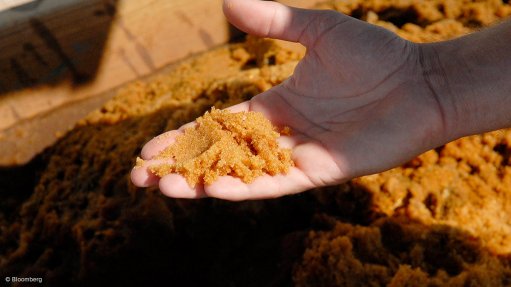
Photo by: Bloomberg
VANCOUVER (miningweekly.com) – Canada’s largest uranium producer Cameco has reported another disappointing quarter, recording an C$18-million loss, or C$0.05 a share, as the termination of a key contract and lower prices weighed on the bottom line.
Excluding special items, the Saskatoon, Saskatchewan-based miner widened the adjusted loss to C$29-million, or C$0.07 a share, falling well short of average Bay Street analyst forecasts calling for earnings of C$0.17 a share.
"We’re managing through the uncertainty, but even low-cost operations like ours, face pressure. Once the uncertainty clears and uranium demand picks up, we expect prices will move significantly higher, and we will be in the enviable position of being able to respond with expanded capacity at our low-cost, world-class assets," president and CEO Tim Gitzel stated.
Revenues fell 4% year-over-year to C$393-million, impacted mainly by uranium revenues in the period falling 25%, compared with 2016, owing to a decrease of 22% in the Canadian dollar average realised price and a decrease in sales volumes of 3%.
Cameco said severance costs and a strengthening Canadian dollar also weighed on its first-quarter results.
The spot price for uranium averaged $23.79/lb in the first quarter, a decline of 25% compared with the 2016 first quarter average price of $31.85/lb. Pricing under the company’s contract portfolio in the first quarter was impacted by the disputed Tepco agreement, weaker uranium prices, and a stronger Canadian dollar than a year ago. The average reported long-term price at the end of the quarter was $33/lb, up $3/lb from year-end.
Tokyo Electric Power (Tepco), the operator of Japan’s wrecked Fukushima nuclear plant, terminated a supply contract in January alleging force majeure, which affects about 9.3-million pounds of uranium deliveries through 2028, worth about C$1.3-billion in revenue to Cameco, including about C$126-million in 2017. Cameco disputes the withdrawal, saying it sees no basis for terminating the agreement.
In the wake of slumping prices following the 2011 Fukushima disaster, Cameco said it is dealing with an oversupplied market and the lingering uncertainty as to how long the weak market conditions will persist, prompting it to focus its resources on the lowest-cost assets, on maintaining a strong balance sheet, and on efficiently managing the company in a low-price environment.
However, Cameco remains cautiously optimistic about the long-term fundamentals for uranium, which accounted for about 66% of consolidated revenues in the first quarter.
The company pointed to industry consultants indicating that cumulative uncovered requirements are expected to total about 800-million pounds over the next nine years. Despite these uncovered requirements not ramping up significantly in the near-term, the company expects the current price-sensitive sentiment to give way to increasing concerns about the security of future supply. That uncertainty creates an opportunity for producers that can weather today’s weak market conditions.
In the first quarter, uranium exploration expenses were C$10-million, a decrease of C$5 million compared with the year-earlier period on the back of a planned reduction in expenditures.
Cameco maintained its guidance across all business units.
Cameco’s stock listed on the TSX fell as much as 11% on Friday morning, changing hands at C$12.75 apiece.